9 Ways to Preserve Eggs (Safely)
Preserve eggs with one of these safe and effective methods to make them last months and even years longer – whether storebought or farm-fresh! There’s no such thing as too many eggs any longer!
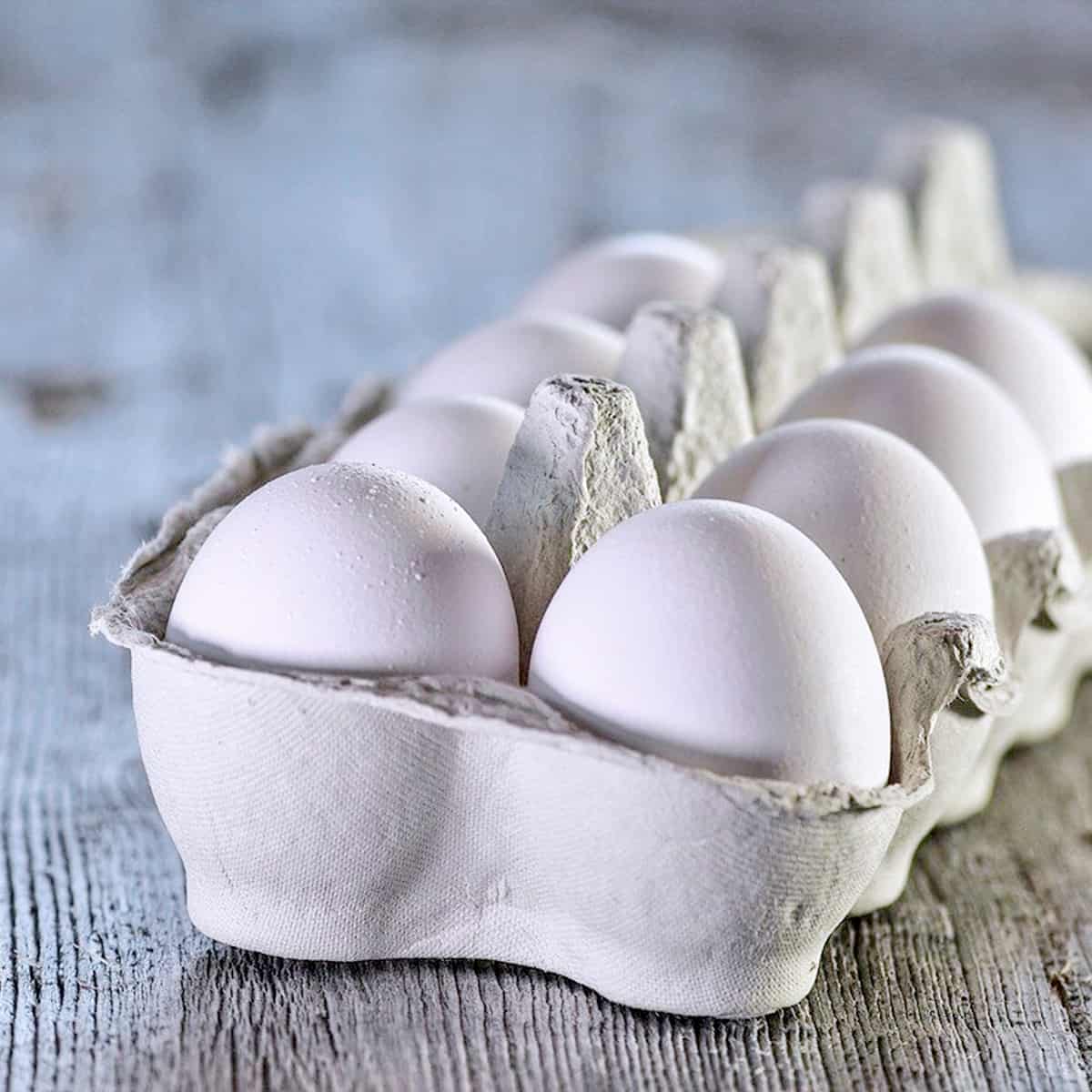
When you have an overabundance of eggs from a new store sale, Easter clear outs (check out the sales cycle list here), or just not eating as quickly as your hens are producing, you need to find ways to preserve those eggs without wasting the poor chicken’s hard work.
Eggs are usually never a food associated with stocking up a pantry unless you’re ready to invest in the #10 can of dehydrated eggs.
But you don’t have to rely on simply hard-boiling eggs as a snack when your family is feeling a little peckish. You have a variety of ways to make eggs work for you beyond a quick scramble for dinner or egg salad forever. Let me help you hatch a few ideas to make your eggs work better for you!
How to Store Eggs
Before we start, if you have fresh farm eggs from your own chickens, you can store them on the counter (without washing!). The membrane coating on them called “bloom” keeps the egg naturally protected in the nest, and it works on your counter, too! Simply brush off any debris before placing on your counter. If it’s any dirtier than that, follow these cleaning steps.
9 Ways to Preserve Eggs
1. Freeze Eggs
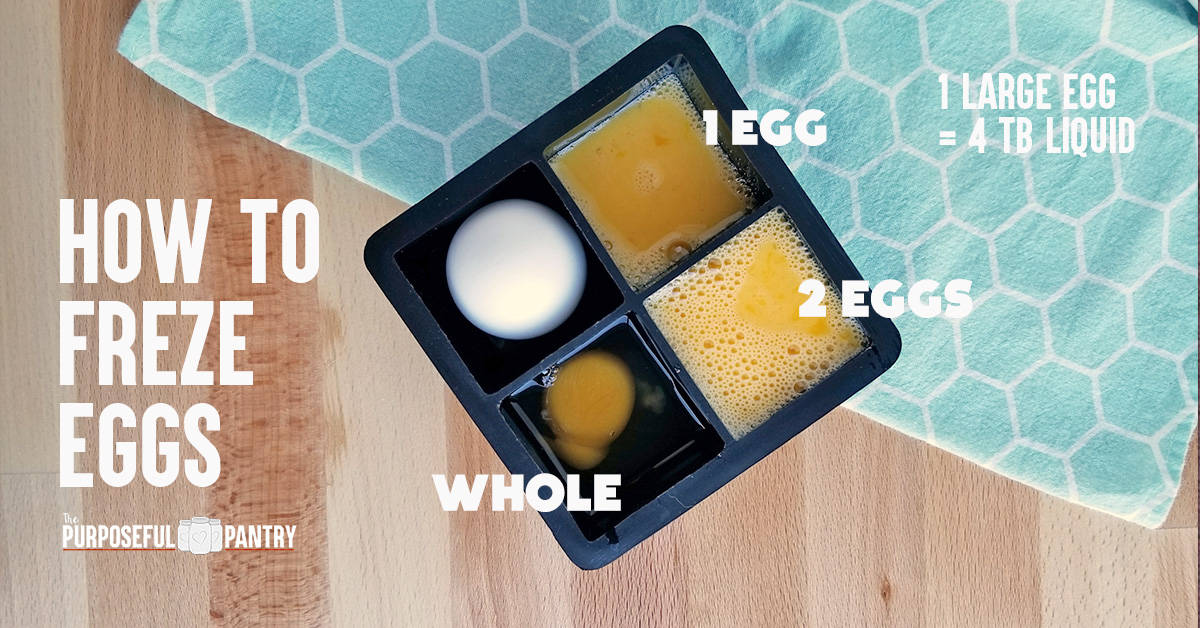
To me, this is the easiest way to preserve eggs. Little fuss or muss.
Ice Cube Tray Method to Freeze Eggs
- Crack eggs into bowl
- Lightly scramble
- Pour into ice cube trays. I love these silicone ice cube trays I recently purchased from Amazon.
You will want to test your particular ice cube trays to ensure that your conversion is correct. In a standard tray, 1 “cube” equals 1/4 cup of scramble equals one egg. However, ice cube trays come in all sizes and shapes, so test yours first to ensure they fit. The silicone trays that I listed above only hold about 1/2 an egg per square – but I’m good with that* – I make sure to label my zip-top bag with the equivalent measurement in the bag.
*Turns out, I wasn’t good with only 1/2 egg. I switched to this silicone ice cube tray (in the photo above) and LOVE it. 1 cube = 2 eggs, but I generally do just 1 egg per cube now. It also works great for freezing herbs and more!
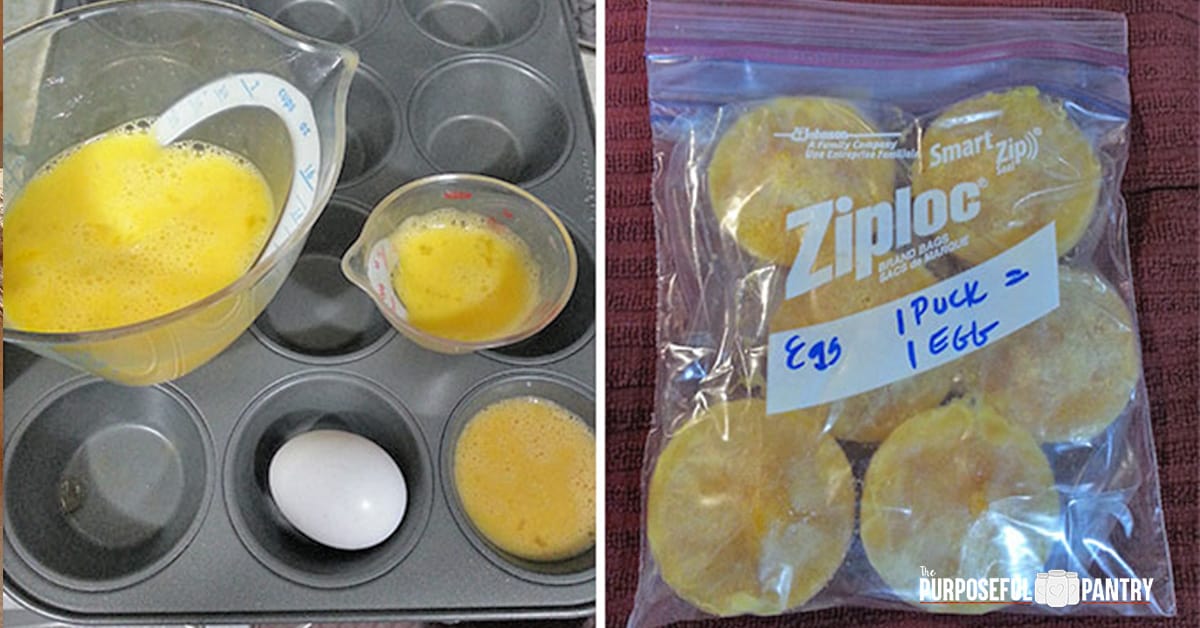
Muffin Tin Method to Freeze Eggs
Put your eggs into muffin tins!
- Crack eggs into a bowl;
- Lightly scramble;
- Pour into muffin tin trays.
This example is my smaller muffin tin which is 1 egg = 3-4 TB = 1 puck. However, if you have larger muffin tins, you may be able to do 2-3 eggs if that’s a better number for you.
I freeze the trays, then double-seal the egg pucks in zip-top bags (removing all the air with a straw), and place them in the freezer.
TIP: Remember, while store-bought eggs may be listed as large, sizes and volumes do still vary. I still use the 1 large egg = 4 TB rule to help me pour into molds. In general, it won’t matter if you are a little off in your baking unless you’re working with an egg-specific dish, in which case I wouldn’t use frozen eggs. These are more for quick scrambles, baking, etc.
Freezing Eggs Video
2. Dehydrate Eggs
Eggs can be safely dried if they are cooked fully before the dehydrating process. And remember, they are best stored in the freezer for long-term storage because the fats may go rancid over time.
The National Center for Home Food Preservation says:
“…eggs are not recommended for home drying because of the high risk of food poisoning. Commercially dried milk and egg products are processed rapidly at temperatures high enough to prevent bacterial contamination. Home dryers cannot duplicate this process, and the safety of home-dried milk and egg products cannot be guaranteed.”
National Center for Home Food Preservation
- How to Dehydrate Eggs (or not) by The Prairie Homestead (And after talking to Jill on her podcast a few months ago, she still has the same opinion of doing raw eggs — don’t.
- How to Make Powdered Eggs by One Good Thing by Jillee
Now, the difference is…. dehydrating raw eggs vs dehydrating cooked eggs. With raw eggs, you have issues with where the eggs are sourced from, whether they are pasteurized, the risk of salmonella poisoning, etc. Raw eggs can be left at unsafe temperatures for too long during the dehydrating process, making them a risk.
You run less risk with cooked eggs, but they aren’t as versatile as doing raw eggs.
“Dairy and eggs are not recommended for home drying because of the high risk of food poisoning. Commercially dried milk and egg products are processed rapidly at temperatures high enough to prevent bacterial contamination. Home dryers cannot duplicate this process, and the safety of home-dried milk and egg products cannot be guaranteed.”National Center for Home Food Preservation
► Looking for a dehydrator or other tools that you might need? I’ve got a lot of recommendations here.
Salmonella Risks
Statement from the FDA on salmonella in eggs in the US market:
FDA requires all cartons of shell eggs that have not been treated to destroy Salmonella to carry this safe handling statement:
Eggs that have been treated to destroy Salmonella–by in-shell pasteurization, for example–are not required to carry safe handling instructions, but the labeling will usually say that they have been treated.
—Food and Drug Administration
Safe Temperature for Dehydrating Eggs
As with the information above, if you choose to dehydrate eggs at home, please don’t follow the typical recommendation of 140°F/60°C that you may see on so many sites. This won’t kill the harmful bacteria that the National Center for Home Food Preservation warns against.
Choose to use the 165°F/72°C temperature to help mitigate that risk.
How are Commercial Dried Eggs Made?
Eggs sourced by companies like Augason Farms are dehydrated, but unlike home dehydrators, they are done in a different manner.
Eggs are pasteurized, then sprayed into a heated room in a thin layer, and the water evaporates immediately.
3. Mineral Oil Preserved Eggs
There was a way to preserve your farm-fresh eggs if you coated them in food-grade mineral oil, put them back into a container, and let them sit. Who knew it could be that easy? But does it work? Check out Jamie’s year-long experiment to see.
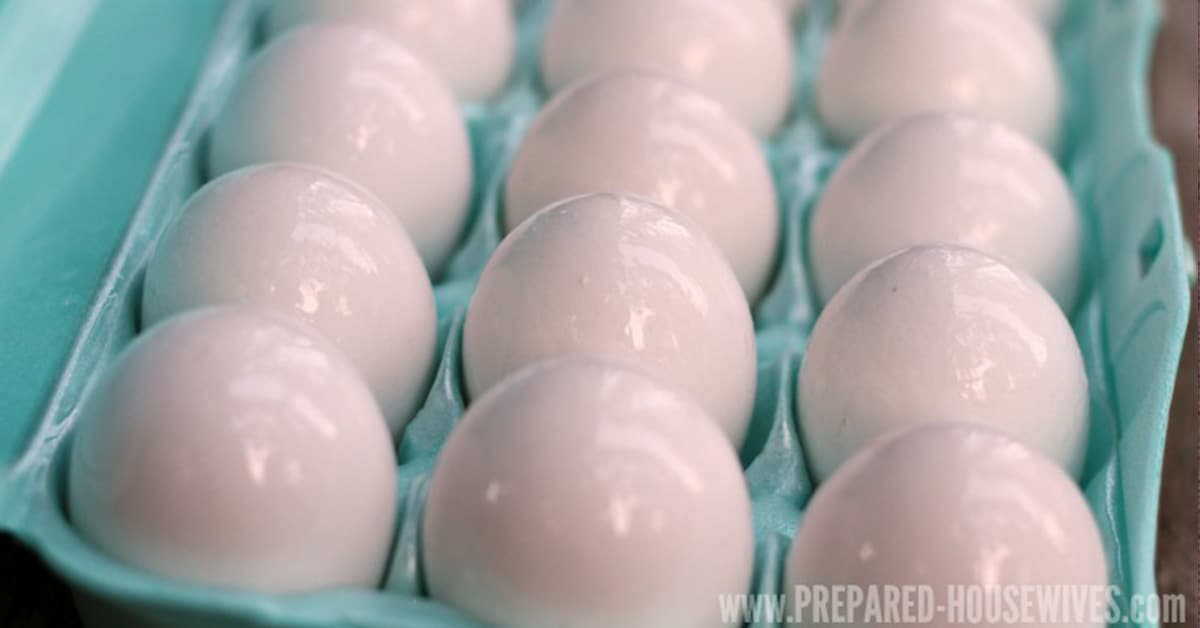
However, you’ll want to read this information to see the ramifications of this method.
Basic Steps:
- Warm food-grade mineral oil slightly (you can pick it up from Amazon here. This is an affiliate link)
- Coat eggs in mineral oil
- Put egg pointy side down in carton
- Rotate monthly – flip the carton (not the eggs)
- Store for up to 9 months in cool (65-68F / 75%humidity), or in fridge for longer storage
Read the full instructions here
4. Freeze Dry Eggs
Granted, to do this one, you’re going to have to own a freeze dryer. But if you do, you can freeze dry both raw and cooked eggs.
“[…] raw eggs can be whisked, freeze-dried and kept in their powdered form to used in all baking and cooking recipes (2 tablespoons of egg powder equals one egg). Or, eggs can be freeze-dried in their scrambled state and easily re-hydrated with a little water in a hot skillet.” Check out this post by Harvest Right on 4 unique foods you can freeze dry, which includes eggs!
5. Freeze Scrambled Eggs
A great standby for almost any food is to cook it and freeze it so that it is ready to eat after a warm-up. This is a super easy way to preserve eggs and build your ready-to-eat stockpile for meal planning.
You can lightly scramble eggs and freeze them in serving-sized portions, then gently warm them up (slightly undercooking them will allow them to taste better one heated up). You can also create omelets, breakfast casseroles, and breakfast tacos, and egg muffins.
Darcy’s Tip
TIP: If you don’t like how soggy tortillas can be after coming out from the freezer and microwave, consider freezing only the ‘guts’ of your breakfast tacos, then adding a freshly toasted tortilla to the thawed mixture for breakfast tacos that are awesome!
6. Hard Boiled Eggs
While hard-boiled eggs aren’t as versatile as frozen raw eggs, they are still good to have on hand. They are good for about seven days, but can extend the life of those eggs you think are just about to be done.
Here are ways you can use hard-boiled eggs.
- Salads – just chop up and add to your salads
- Eating as protein shots
- Egg salad
- Deviled eggs (step up your game with these Fermented Jalapeno Deviled Eggs from Traditional Cooking School).
- 25 Ways to use up hard-boiled eggs
Try this way of smoking eggs!
When you have an overabundance, any way to repurpose them comes in handy! You can boil on the stovetop, use your Instant Pot (this is my favorite method), and even bake eggs per Alton Brown. And if you need a little help on the many ways you can hard-boil and which methods work the best, check out this post on hard boiling eggs from my friend, Laurie @ Common Sense Home
7. Water Glass Storage
Victoria from A Modern Homestead shows how to water glass eggs that can last for a year on your pantry shelf. And here’s an update on how water glass eggs taste a year later. You can also download the printable instructions on water glassing eggs A Modern Homestead.
The ingredient that is important to remember is to use pickling lime (hydrated lime) as Janet from Timercreek Farm shows in her tutorial on how to water glass farm fresh eggs.
SAFETY CONCERN: This is NOT a preservation method for storebought eggs in the US. Per the National Center for Home Food Preservation guidelines, it is not recommended to water glass eggs for preserving.
Research shows that Salmonella enteritidis can contaminate eggs as “Eggs are among the most nutritious and cheapest protein foods on earth and can be part of a healthy diet. However, they are perishable just like raw meat, poultry, and fish. Unbroken, clean, fresh shell eggs may contain Salmonella enteritidis (SE) bacteria that can cause foodborne illness. While the number of eggs affected is quite small, there have been cases of foodborne illness in the last few years. To be safe, eggs must be safely handled, promptly refrigerated, and thoroughly cooked.” Source: Food Safety and Inspection Service, 2019 2 they are formed inside the hen’s reproductive organs, and there is no way a person can know if it is there.
Utah State Univeristy Extension
8. Pickling Eggs
I’ll be honest: I’ve been too chicken to try pickled eggs (I have a gross visual of the guy in Dances with Wolves digging into a jar full of pickled eggs. Besides, I’m not a fan of the taste of most pickled things. I need to overcome it, but I’m not going to start with eggs, trust me!) BUT…it may be a preservation method that you’ll learn to love! Here are 4 ways to pickle eggs that you might want to try!
9. Salting Eggs
Preserving eggs in salt is a technique from China that preserves eggs outside of the shell in salt to use for later cooking methods. You crack open an egg into salt, preserve it in layers of salt and wine and let it sit for months. It’s intriguing and I know people are doing it in the food industry commercially for restaurants, etc. On Hunter, Angler Gardener, Cook, he does it with egg yolks and adds it to noodles. Here’s another version on how to salt cure egg yolks. Will this work for you? You’ll have to decide and give it a try.
Use Egg Substitutes for Baking
- Powdered Eggs – While powdered eggs may not be the best at replacing scrambled eggs in a meal, in a pinch they can. They’re best used to replace eggs in recipes where they can blend in with the local crowd. You can get them here on Amazon or try any of the other food storage companies like Auguson Farms, Emergency Essentials, etc.
- Flax Seed or Chia Seed – you can soak flax or chia seed in water to create a gelatinous ‘goo’ that is a good egg replacement, especially for baked goods.
Here are 50+ Ways to Use Eggs with The Prairie Homestead that can help you focus your recipes to using up your abundance of eggs.
Crossing the Road to Preserve Eggs
Hopefully, you’ll forgive the fowl puns, but I couldn’t help myself!
Remember that in your quest to extend your food storage with eggs, find a technique that you’re comfortable with, get some eggs stored. Some of the techniques listed here may be a little outside of your comfort zone, but they are methods that have been used for years by others. I am partial to freezing eggs to make them most versatile for me in cooking and baking down the road, but I have a stash of commercially dried eggs saved for a rainy day.
Do you have a way that you preserve eggs that I haven’t listed? Which one do you think you might try? I’d love to hear your comments below!
Check out more in the Preserving Series:



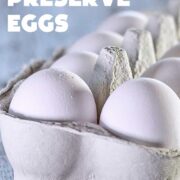
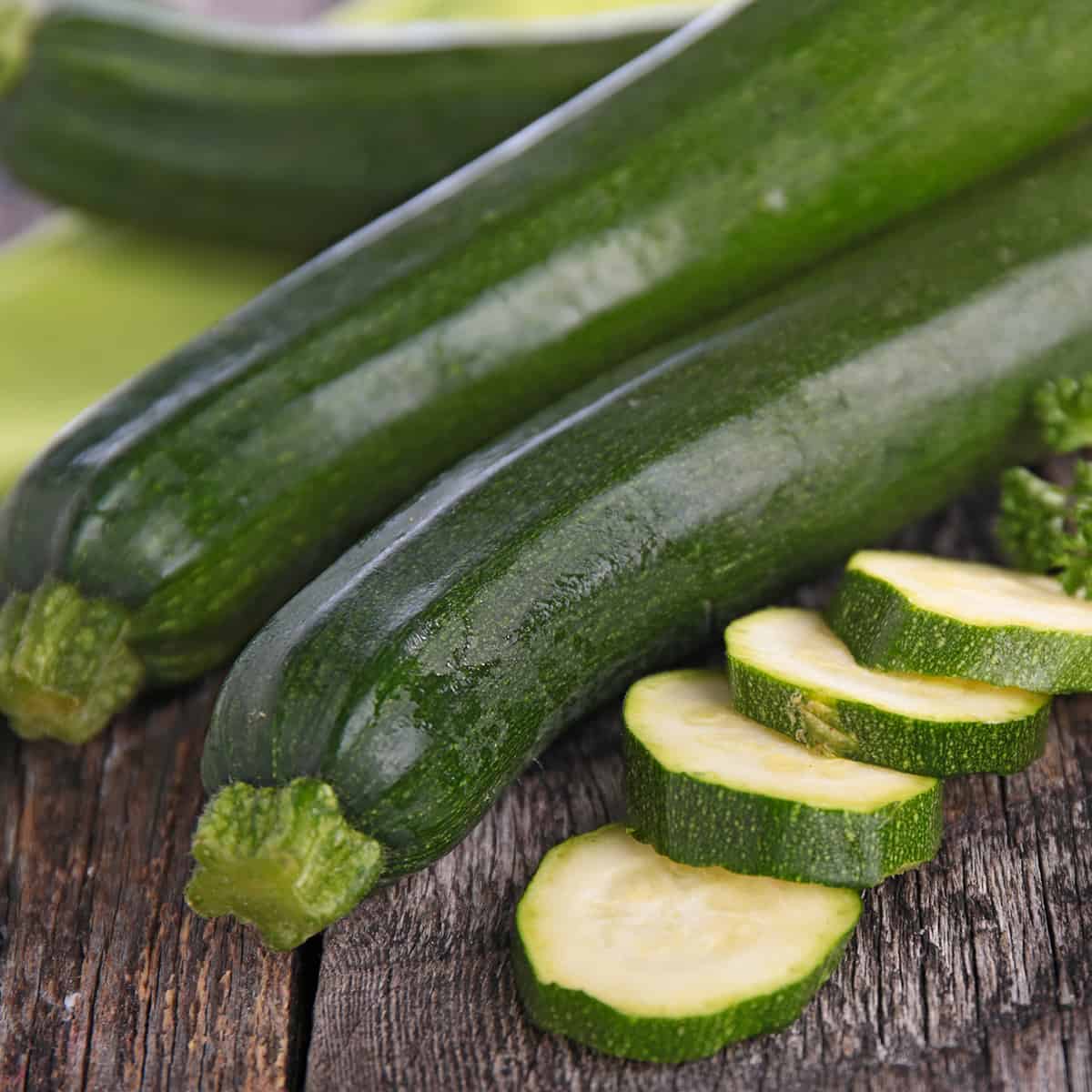
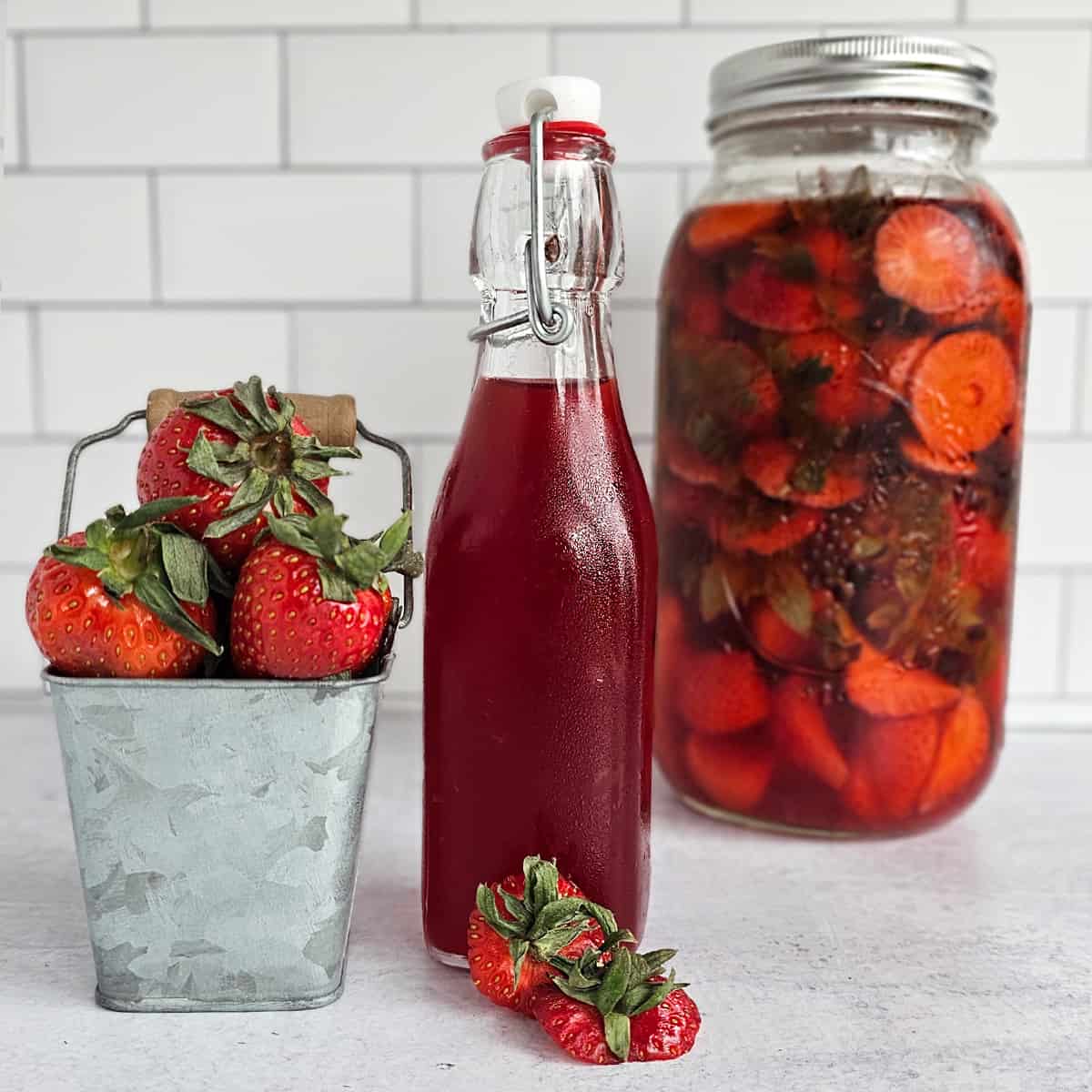

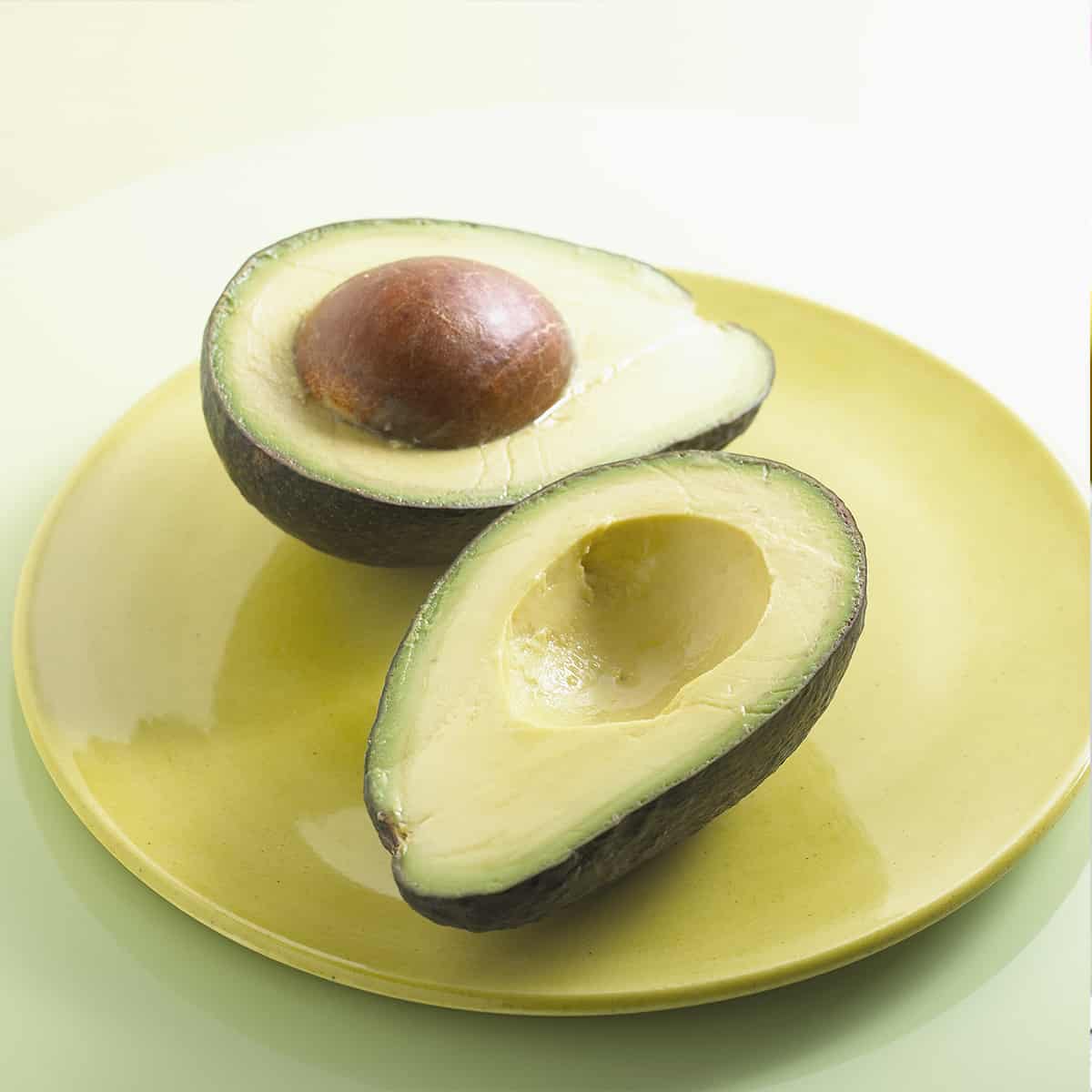
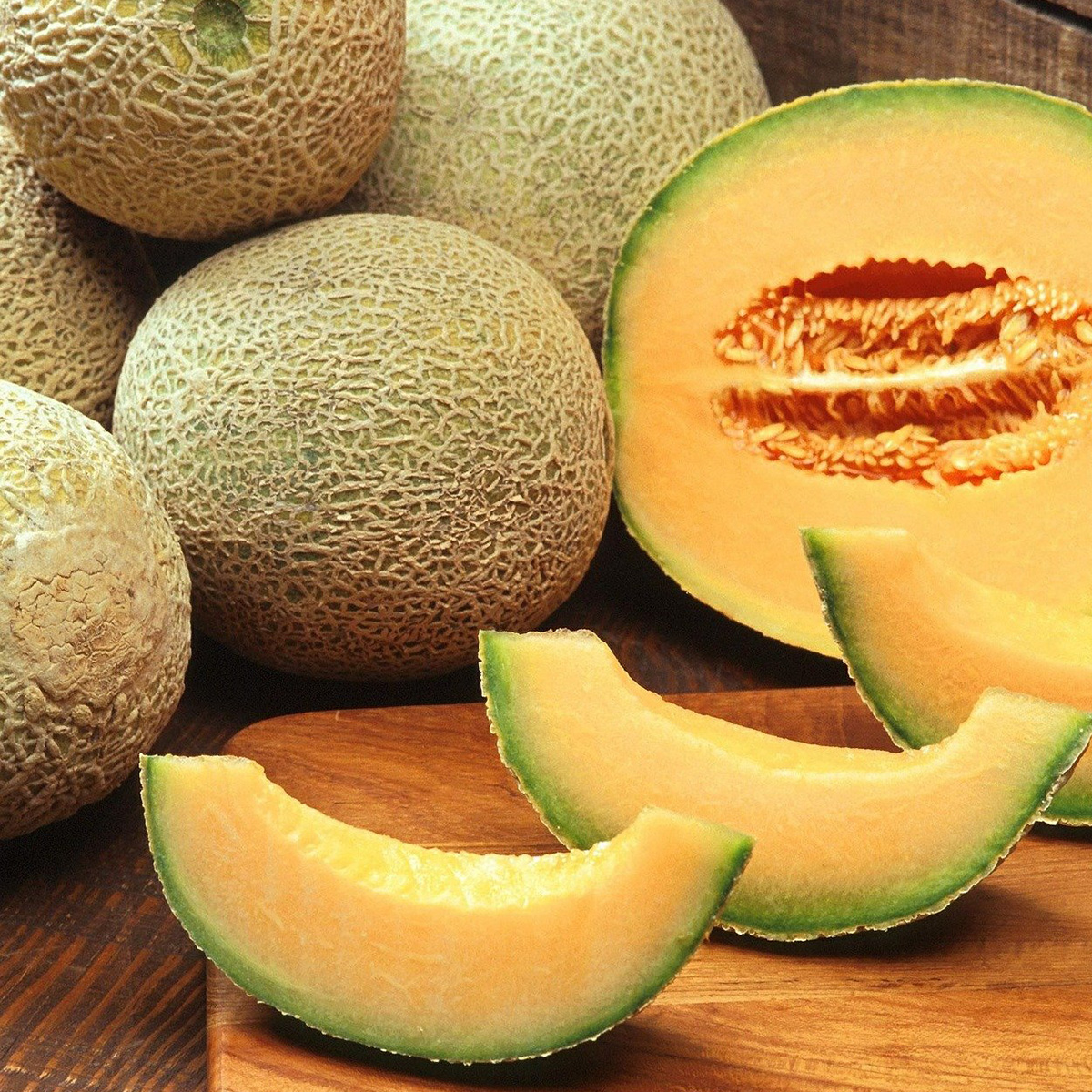

Hi Darcy!
I love all your tips on eggs and thank you. My question is about powered dehydrated veggies, and how some last longer than others as a power. I know they are shelf stable for a specific time, but will the powers last longer in the freezer?
I am just trying to be extra careful with all food storage. Thanks for all your help!
Powders can last anywhere from 6 mos to 2+ years depending on the food. Mushroom powder, potato powder, etc., are hearty and can last a while, while fruits and lesser veg will lose flavor, color and potency faster. It’s why I don’t recommend powdering large amounts for long-term storage. Powder what you need for six months or so, and store the rest whole. And yes, they will last longer if you keep them in the freezer. But my biggest advice is use them.
I watched another homesteader site and she said you can dehydrate raw eggs.
She said it is ok and they will last a long time. I dehydrated and powdered as much as 15 dozen. Now I am afraid to use them. Is there a way to know if they are good or do I need to toss them?
You’ll find lots of Youtubers who suggest you can do all sorts of things with food. My recommendations come from safest food handling, guided by the National Center for Home Food Preservation. What you choose to do in your home is up to you (and the same of what other Youtubers do in their homes). If your eggs were from chickens you raised at home, your dehydrator doesn’t cycle less than the 160°F degrees that is recommended for chicken products, and that your storage is secure, you may choose to use your eggs. Eggs have a shorter shelf-life than other dehydrated foods because of the fat and protein breakdown, which is why even freeze-dry companies suggest storing opened containers of dehydrated eggs (which are done with a spray-drying technique we can’t do at home) in the freezer.
So as you can see, there are issues with dehydrating raw eggs at home. However, only you can decide if you will use those eggs. Many people do them – I teach from the safest of food handling recommendations of the NCHFP which many choose to look at as being too cautious. I cannot make the decision for you.
Aren’t you going to rehydrate them and COOK them?????? If you’re cooking them at the recommended temp, what’s the difference? They should be just as safe as they would have been cooked ar the recommended temp before dehydration!
Assuming you cook them fully to hard stage – sure. But we still follow the recommendations of the National Center for Home food Preservation with them about warning about the issues. What you choose to do in your home is your choice.
Can you dehydrate the shells to powder them for the garden? If so, how long. I have a Cosori unit. Thanks,
Yes,, until they are dry and crumbly 😉
I have found when I froze a whole egg without mixing it a bit it became so rubbery I couldn’t even beat it with a mixer. I just read last night on National Center for Home food Preservation site to add a little sugar, salt or corn syrup to the eggs, depending on the intended use. You can check the site for the amounts. It’s a very minimal amount per cup of egg.
Yes, you must add 1/8 teaspoon salt or sugar to help that gelatinous effect. Salt for savory and sugar for sweet use. It works great.
I have looked everywhere for just plain food grade mineral oil and all I can find is butcher block conditioner that has food grade oil and natural waxes added. Would this be Ok to use?
Thank you
The link is in the post notes giving you two options that are available on Amazon and save to use.
Is the reason for not using store bought eggs in the water glass method because the bloom is gone or the timing can’t be figured on how old the eggs are?
Because the bloom is gone – needs to be for fresh eggs only.
I have just frozen my first batch of organic eggs bought from Costco. Rather than scrambling them, I just break one egg into each silicone muffin liner that is sitting in my muffin pan. Then I put the muffin tin in my chest freezer until they’re hard, pop them out and peel off the silicone liner, and put them in a plastic freezer bag as you described. They are very cute and each egg feels one silicone muffin cup perfectly. I was only using a single freezer bag, but I like your idea of using two of them better.
Ok Here is one I had from a VERY old book. Story had to do with a family heading west… Covered wagon style. Grandfather took eggs and layered with lard in a barrel. Fresh eggs in the middle of nowhere.
Sure, that may have worked. But you cannot do that with commercial eggs now and be safe. The outer coating on the eggs has been washed away, which makes them unsafe for longterm storage in the shell.
Hi Darcy…I don’t have enough eggs from my hens these days to worry about all the extras. But I used to store them unwashed in cartons, or frozen like you described. That took care of my extras! It is interesting to read about all of the extra ways to store them! Thanks for sharing!